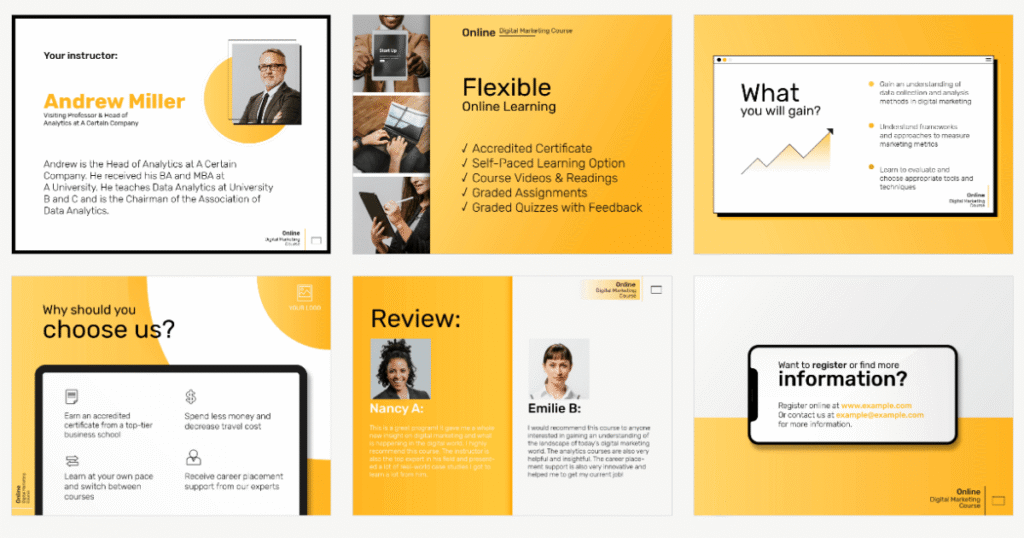The digital marketing industry is experiencing unprecedented growth in 2025, with companies desperately seeking skilled professionals who can navigate the ever-evolving online landscape. Whether you’re a recent graduate, career changer, or someone looking to upskill, now is the perfect time to become a digital marketer.
Digital marketing encompasses all marketing efforts that use electronic devices or the internet to connect with potential customers. Unlike traditional marketing methods like print ads or billboards, digital marketing allows businesses to reach their target audience with precision, measure results in real-time, and adjust strategies on the fly.
This comprehensive guide will walk you through everything you need to know to start your digital marketing journey. From understanding the core fundamentals to landing your first job, we’ll cover the essential steps, skills, and strategies that will set you up for success in this dynamic field.
By the end of this guide, you’ll have a clear roadmap to become a digital marketer and the confidence to take your first steps into this exciting career.
Table of Contents
ToggleWhat is Digital Marketing? Understanding the Fundamentals
Digital marketing is the practice of promoting products, services, or brands through digital channels to reach and engage with potential customers. It’s fundamentally different from traditional marketing because it leverages the power of the internet, mobile devices, and digital technologies to create more targeted, measurable, and interactive marketing experiences.
The key difference between traditional and digital marketing lies in the level of control and measurement available. While a billboard might reach thousands of people, you can’t easily track who saw it or what actions they took afterward.

Digital marketing, on the other hand, provides detailed analytics about who engaged with your content, how they found you, and what steps they took in their customer journey.
Digital marketing operates across various channels and platforms, including search engines, social media networks, email, websites, and mobile apps. Each channel offers unique opportunities to connect with audiences at different stages of their buying journey.
Data and analytics form the backbone of digital marketing success. Every click, view, purchase, and interaction generates valuable data that marketers use to optimize campaigns, understand customer behavior, and improve return on investment.
The Pillars of Digital Marketing – Your Foundation for Success
Understanding the pillars of digital marketing is crucial for anyone looking to enter this field. These seven core areas form the foundation of virtually every digital marketing strategy:
1. Content Marketing focuses on creating valuable, relevant content that attracts and engages your target audience. This includes blog posts, videos, infographics, podcasts, and social media content that provides genuine value to potential customers.
2. Search Engine Optimization (SEO) involves optimizing websites and content to rank higher in search engine results pages. SEO is a long-term strategy that helps businesses gain organic visibility and attract qualified traffic without paying for ads.
3. Pay-Per-Click Advertising (PPC) encompasses paid advertising campaigns across platforms like Google Ads, Facebook Ads, and LinkedIn Ads. PPC allows for immediate visibility and precise targeting, making it ideal for businesses looking for quick results.

4. Social Media Marketing involves building communities and engaging with audiences across social platforms. This pillar focuses on creating brand awareness, fostering relationships, and driving engagement through platforms like Instagram, Facebook, LinkedIn, and TikTok.
5. Email Marketing remains one of the most effective digital marketing channels, providing direct communication with prospects and customers. It’s perfect for nurturing leads, sharing updates, and driving conversions through personalized messaging.
6. Analytics and Data Analysis involves measuring, analyzing, and interpreting marketing performance data. This pillar helps marketers understand what’s working, what isn’t, and how to optimize campaigns for better results.
Career Paths in Digital Marketing – Finding Your Specialization
The beauty of digital marketing lies in its diverse career paths in digital marketing, offering opportunities for people with different skills, interests, and backgrounds. Understanding these paths will help you identify where your strengths align with market opportunities.
Specialist Roles
- SEO Specialists: Focus exclusively on improving organic search rankings and visibility. They conduct keyword research, optimize website content, build backlinks, and analyze search performance. This role is perfect for detail-oriented individuals who enjoy technical challenges and long-term strategy development.
- PPC Managers: Specialize in creating and managing paid advertising campaigns across platforms like Google Ads, Facebook Ads, and Microsoft Advertising. They’re responsible for budget management, audience targeting, ad creation, and performance optimization.
- Social Media Managers: Develop and execute social media strategies across various platforms. They create content, engage with communities, manage posting schedules, and analyze social media performance metrics.
- Content Marketing Managers: Oversee content strategy, creation, and distribution. They work with writers, designers, and video producers to create compelling content that drives engagement and conversions.
- Email Marketing Specialists: Focus on building and nurturing email lists, creating automated email sequences, and optimizing email campaigns for maximum engagement and conversions.

Generalist Roles
- Digital Marketing Managers: They oversee multiple aspects of digital marketing, coordinating various channels and specialists to achieve overall marketing objectives. This role requires a broad understanding of all digital marketing pillars and strong project management skills.
- Growth Marketing Managers: Focus specifically on driving business growth through data-driven marketing experiments and optimization. They work across multiple channels to identify and scale the most effective growth strategies.
- Digital Marketing Consultants: Will work independently or for agencies, providing strategic guidance and implementation support to multiple clients. This path offers flexibility and variety but requires strong business development and client management skills.
Salary Expectations and Growth Potential
Entry-level digital marketing positions typically range from $35,000 to $50,000 annually, depending on location and specialization. Mid-level professionals can expect $50,000 to $80,000, while senior-level experts often earn $80,000 to $120,000 or more.
Geographic location significantly impacts salary expectations, with major metropolitan areas generally offering higher compensation. Remote work opportunities have also expanded, allowing professionals to access higher-paying positions regardless of their physical location.How to start learning
How to Start Learning Digital Marketing – Your Learning Roadmap
One of the most appealing aspects of digital marketing is how accessible it is to learn. You don’t necessarily need a specific degree or expensive training to get started. Here’s how to start learning digital marketing effectively.
Self-Learning Resources
The internet offers countless free resources for aspiring digital marketers. Google Digital Garage provides comprehensive courses covering various aspects of digital marketing, from search engine optimization to social media advertising.

HubSpot Academy
It offers free certifications in content marketing, email marketing, and inbound marketing methodology. These courses are industry-recognized and provide practical skills you can immediately apply.
Facebook Blueprint
It provides free training on Facebook and Instagram advertising, covering everything from basic concepts to advanced campaign optimization techniques.
YouTube channels
Channels like Brian Dean, Ahrefs, Neil Patel, Moz, Search Engine Journal and Search Engine Land offer regular updates on industry trends, tutorials, and case studies. Podcasts such as Marketing Over Coffee and The Digital Marketing Podcast provide insights during commutes or workouts.
Building Practical Digital Marketing Experience
Learning theory is important, but gaining hands-on digital marketing experience is crucial for career success. Start by creating your own blog or website where you can practice SEO, content creation, and analytics implementation.
Offer to manage social media accounts for local businesses, nonprofits, or friends’ companies. This provides real-world experience while building your portfolio and network.
Run small PPC campaigns with modest budgets to understand how paid advertising works. Even spending $100 on Google Ads or Facebook Ads can provide valuable learning experiences.
Volunteer your digital marketing skills for charitable organizations. Nonprofits often need marketing help and provide excellent opportunities to practice your skills while supporting good causes.
Focus on building your personal brand online. Create profiles on professional networks, share industry insights, and demonstrate your knowledge through content creation.

Essential Tools to Master
- Familiarize yourself with Google Analytics and Google Tag Manager for website tracking and analysis. These tools are fundamental to understanding digital marketing performance.
- Learn Google Ads and Facebook Ads Manager for paid advertising campaign management. Most digital marketing roles require familiarity with at least one of these platforms.
- Explore email marketing platforms like Mailchimp or ConvertKit to understand how email campaigns are created, automated, and optimized.
- Get comfortable with social media management tools like Hootsuite or Buffer for scheduling posts and managing multiple social media accounts efficiently.
- Basic design skills using tools like Canva or Adobe Creative Suite will make you more versatile and valuable in any digital marketing role.
Digital Marketing Certifications – Credentials That Matter
Digital marketing certifications can significantly boost your credibility and demonstrate your commitment to professional development. However, not all certifications carry equal weight in the industry.
Free Industry Certifications
- Google Ads Certifications are among the most respected credentials in digital marketing. These free certifications cover Search, Display, Video, Shopping, and App advertising, providing comprehensive knowledge of Google’s advertising ecosystem.
- Google Analytics Individual Qualification (IQ) demonstrates your ability to use Google Analytics effectively. This certification is essential for anyone involved in digital marketing measurement and analysis.
- HubSpot offers various free certifications in content marketing, email marketing, and inbound marketing. These certifications are well-regarded and provide practical skills that employers value.
- Facebook Blueprint Certifications validate your expertise in Facebook and Instagram advertising. Given the popularity of social media advertising, these certifications are increasingly valuable.
Paid Professional Certifications
While free certifications provide excellent foundational knowledge, some paid certifications offer more advanced training and industry recognition.
- Hootsuite Social Media Marketing Certification provides comprehensive social media strategy and management training. This certification is particularly valuable for social media specialist roles.
- SEMrush and Ahrefs offer SEO and content marketing certifications that demonstrate advanced knowledge of these crucial digital marketing areas.
The key is to prioritize certifications that align with your career goals and the specific roles you’re targeting. Start with free Google certifications, then add specialized certifications as you develop your career focus.
Building Your First Digital Marketing Portfolio
A strong portfolio is essential for landing your first digital marketing job. Your portfolio should demonstrate both your technical skills and your ability to drive results.

Essential Portfolio Components
- Include detailed case studies from any projects you’ve completed, even if they were practice projects or volunteer work. Focus on the challenges you faced, the strategies you implemented, and the results you achieved.
- Document before-and-after results with specific metrics whenever possible. Even small improvements in website traffic, social media engagement, or email open rates can demonstrate your impact.
- Include screenshots of campaigns, analytics dashboards, and tools you’ve used. Visual evidence of your work helps potential employers understand your hands-on experience.
- Showcase your personal branding efforts, including your website, social media presence, and any content you’ve created. This demonstrates your ability to market yourself, which is crucial in digital marketing.
Creating Your First Projects
- Set up Google Analytics on a website and create reports showing traffic patterns, user behavior, and conversion tracking. This demonstrates your analytical skills and tool proficiency.
- Create and document a social media campaign, including content planning, posting schedules, and engagement metrics. Show how you grew followers or increased engagement over time.
- Write and promote blog content, documenting how you optimized it for SEO and promoted it across various channels. Track and report on traffic, shares, and engagement.
- Build an email marketing funnel using platforms like Mailchimp, showing how you segment audiences, create automated sequences, and measure performance.
Staying Current in This Ever-Changing Field
Digital marketing evolves rapidly, with new platforms, algorithms, and strategies emerging regularly. Staying current is crucial for long-term success. Subscribe to industry publications like Marketing Land, Search Engine Journal, and Social Media Examiner. These resources provide regular updates on industry changes and best practices.
Follow thought leaders on social media and LinkedIn. Industry experts often share insights, predictions, and real-time updates about changes affecting digital marketers. Attend virtual conferences, webinars, and local marketing meetups. These events provide networking opportunities and exposure to cutting-edge strategies and technologies.
Join professional communities and forums where digital marketers share experiences, ask questions, and discuss industry trends. Communities like Reddit’s digital marketing forums or specialized Facebook groups offer valuable peer learning opportunities.
Your Next Steps to Become a Digital Marketer
Starting your digital marketing journey might seem overwhelming, but breaking it down into manageable steps makes it achievable. Begin by choosing one or two pillars of digital marketing that align with your interests and strengths.Focus on gaining practical experience through personal projects, volunteer work, or internships. Real-world application of digital marketing concepts is invaluable for both learning and portfolio development.
Pursue relevant certifications starting with free options from Google and HubSpot. These credentials will boost your confidence and credibility with potential employers. Build your network by engaging with other digital marketers online and attending industry events. The digital marketing community is generally welcoming and supportive of newcomers.
Remember that becoming a digital marketer is a journey, not a destination. The field constantly evolves, requiring continuous learning and adaptation. Embrace this dynamic nature as an opportunity for growth and career development.
Whether you’re looking to transition careers or start fresh in the digital space, the opportunities in digital marketing are abundant and growing. With dedication, continuous learning, and practical application, you can successfully become a digital marketer and build a rewarding career in this exciting field.
Start today by choosing your first learning resource or project. Your future self will thank you for taking that first step toward a dynamic and fulfilling digital marketing career.






